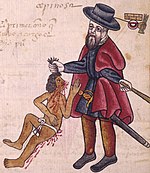
Denial of genocides of Indigenous peoples consists of a claim that has denied any of the multiple genocides and atrocity crimes, which have been committed against Indigenous peoples. The denialism claim contradicts the academic consensus, which acknowledges that genocide was committed. The claim is a form of denialism, genocide denial, historical negationism and historical revisionism. The atrocity crimes include genocide, crimes against humanity, war crimes, and ethnic cleansing.
During European colonization, many empires have colonized territories inhabited by what would be known today as Indigenous peoples. Many new colonies have surviving Indigenous peoples within their new political borders, and in this process, atrocities have been committed against Indigenous nations. The atrocities against Indigenous peoples have related to forced displacement, exile, introduction of new diseases, forced containment in reservations, forced assimilation, forced labour, criminalization, dispossession, land theft, compulsory sterilization, forcibly transferring children of the group to another group, separating children from their families, enslavement, captivity, massacres, forced religious conversion, cultural genocide, and reduction of means of subsistence and subsequent starvation and disease.
Non-Indigenous scholars are now increasingly examining the impact of settler colonialism and internal colonialism from the perspective of Indigenous peoples.
Background
Defining genocide

In 1948, the Genocide Convention defined genocide as any of five "acts committed with intent to destroy, in whole or in part, a national, ethnical, racial or religious group". These five acts include killing members of the group, causing them serious bodily or mental harm, imposing living conditions intended to destroy the group, preventing births, and forcibly transferring children out of the group. Additional scholarly definitions have been used to examine the diverse history of genocide, including those that include cultural and ethnic genocide as per Raphael Lemkin.
Edward S. Herman and Noam Chomsky have argued that definitions of key terms, as well as the attention a society provides to a specific issue, such as genocide, is the product of mass media, as they mention in Manufacturing Consent: "A propaganda system will consistently portray people abused in enemy states as worthy victims, whereas those treated with equal or greater severity by its own government or clients will be unworthy". Thus, Chomsky views the term genocide as one that is used by those in positions of political power and media prominence against their rivals, but people in positions of power will avoid using the term to describe their own actions, past and present.
Bradley Campbell has proposed a theory of genocide as a function of minority status, social segregation, low population size, and lack of visibility. Further factors include marginalization, the lack of political representation, and lower economic or social status.
In the latter part of the 20th century, the genocide of Indigenous peoples attracted more attention from the international community, including scholars and human rights organizations.
Rationalization
American academic and activist Gregory Stanton has described ten stages of genocide, in which the ninth stage is extermination and the tenth is denial. During this final stage, Stanton argues that individuals and government may "deny that these crimes meet the definition of genocide", "question whether intent to destroy a group can be proven", and "often blame what happened on the victims". The concept of denial as the final stage of genocide has been discussed in more detail in the 2021 textbook Denial: The Final Stage of Genocide? Stanton also indicates that stages often co-occur; the first eight stages include classification, symbolization, discrimination, dehumanization, organization, polarization, preparation, and persecution. Early denial of genocide often occurred through these stages. For instance, American historian David Stannard explained that European colonizers "purposefully and systematically dehumaniz[ed] the people they were exterminating".
Further, South African sociologist Leo Kuper has described denial as a routine defense, referring to it as a consequence of the Genocide Convention. He argues that denial has become more prevalent because genocide is considered "an international crime with potentially significant sanctions by way of punishment, claims for reparation, and restitution of territorial rights".
Denial examples
According to Robert K. Hitchcock, editor of Modern Genocide, "the destruction of Indigenous peoples and their cultures has been a policy of many of the world's governments, although most government spokespersons argue that the disappearance or disruption of Indigenous societies was not purposeful but rather occurred inadvertently." Despite this, in 2013, Colin Leach et al. found that perpetrator groups denied their group's responsibility, showed low levels of collective guilt, and had low support for reparation policies.
North America
According to a survey conducted between 2016 and 2018, "36% of Americans almost certainly believe that the United States is guilty of committing genocide against Native Americans." Indigenous author Michelle A. Stanley writes that "Indigenous genocide is largely denied, erased, relegated to the distant past, or presented as inevitable". She writes that Indigenous genocide is depicted broadly, without touching on the pattern of a series of separate genocides against multiple distinct tribal nations. Seneca scholar Melissa Michal Slocum said that Native American genocide has been denied by the United States.

According to North American Genocides, edited by Clarke et al., many American scholars deny Indigenous genocide in the Americas, despite agreement from international scholars that it occurred. American historian Ned Blackhawk said that nationalist historiographies have been forms of denial that erase the history of destruction of European colonial expansion. Blackhawk said that near consensus has emerged that genocide against some Indigenous peoples took place in North America following colonization.
Some historians do not consider that genocide of Indigenous peoples took place in North America, including James Axtell, Robert Utley, William Rubinstein, Guenter Lewy and Gary Anderson, although some call the atrocities another name such as ethnic cleansing. Other scholars, including Elazar Barkan and Walter L. Hixson agree with the sentiment that those in the Americas deny the genocide of the regions' Indigenous populations.
On the Columbus Quincentenary, American historian David Stannard highlighted the numerous celebrations and festivities surrounding Columbus alongside "American and European denials of culpability for the most thoroughgoing genocide in the history of the world have assumed a new guise." A similar issue arose when Lynne Cheney, then chair of the National Endowment for the Humanities, rejected a television project celebrating the anniversary, highlighted the proposal's use of the word "genocide". Cheney stated, "We might be interested in funding a film that debated that issue, but we are not about to fund a film that asserts it. Columbus was guilty of many sins, but he was not Hitler."
This particular issue, the comparison to The Holocaust, has been raised by others, as well, with American historian David Stannard pointing to The Holocaust's prominent position in the public eye compared to the global ignorance of atrocities in the Americas.
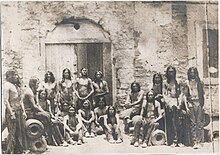
Howard Zinn, Susan Cameron, and Kirsten Dyck have claimed that in American history textbooks, America's history of abuse against Indigenous peoples is mostly ignored or presented from the state's point of view.
In The Other Slavery, American historian Andrés Reséndez compares the thousands of books written about the slavery of Africans to the couple dozen books about Indigenous slavery and argues that the latter has "almost completely erased from our historical memory". He argues that African slavery is more widely accepted because it was legalized and therefore recorded, whereas Indigenous slavery was largely illegal; further, because African slaves needed to be transported, settlers kept record of ship manifests.
Canadian political scientist Adam Jones has said that the historical revisionism has been so thorough that in some cases, the Americas have been depicted as unpopulated before European colonization.
Other claims against the genocide of Indigenous people of the Americas deal with the natural superiority of the European colonizers. For instance, Stannard has argued that British journalist Christopher Hitchens's 1992 essay, "Minority Report", supported social Darwinism.
California
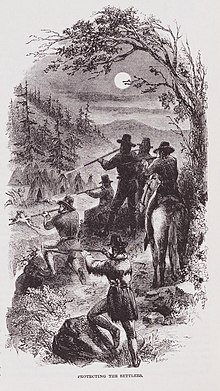
Robert K. Hitchcock says that during the California genocide, "California state legislators, administrators, Indian agents, and townspeople denied that a genocide was happening."
Continuing into the 21st century, Benjamin Madley has stated that the California genocide has "too often concealed, denied, or suppressed". This can be evidenced via social science and history textbooks approved by the California Department of Education that ignore the history of this genocide.
In 2015, English writer and political activist George Monbiot argued that when the Catholic Church canonized 18th-century Christian missionary Junípero Serra, who "founded the system of labour camps that expedited California's cultural genocide", they were, in effect, denying the genocide.
Canada
Canada has received many criticisms regarding its denial of participation in Indigenous genocide, particularly in relation to the Canadian Indian residential school system, and the long-term effects of both residential schooling and colonization more generally.
The Canadian Museum for Human Rights (CMHR) received criticism upon its opening in 2014 because it did not use the term genocide to describe the history of colonialism in Canada. Two years after its opening, Rita K. Dhamoon critiqued the museum's focus on the Holocaust, frame of residential schools as assimilationist and not genocidal, and denial of the genocidal nature of settler colonialism. In 2019, the museum reversed its policy and officially recognizes genocide of Indigenous peoples in Canada in its content.
In 2021, Senator Lynn Beyak generated controversy and was accused of genocide denial in the Canadian Indian residential school system after she voiced disapproval of the final Truth and Reconciliation Commission of Canada report, saying that it had omitted the positives of the school. Similarly, former Conservative Party leader Erin O'Toole said that the residential school system educated Indigenous children, but then changed his view: "The system was intended to remove children from the influence of their homes, families, traditions, and cultures". Former newspaper publisher Conrad Black and others have also been accused of denial.
In 2022, Gregory Stanton, former president of International Association of Genocide Scholars, issued a report of Canada's genocide saying it is in denial. On National Truth and Reconciliation Day in 2023, Trudeau said that denialism was on the rise.
Response
In 2015, Supreme Court Chief Justice Beverly McLachlin said that Canada's historical treatment of Indigenous peoples was cultural genocide. In 2021, Canadian political scientist David Bruce MacDonald argued that the Canadian government should recognize various atrocities committed against the Indigenous peoples in Canada. Later the same month, Prime Minister Justin Trudeau apologized in the context of the 2021 Canadian Indian residential schools gravesite discoveries.
In 2022, the Canadian government announced that it would pay C$31.5 billion to reform the foster care system and compensate Indigenous families for its deficiencies. The government has acknowledged the overrepresentation of Indigenous children in the foster care system.
In 2023, politician Leah Gazan has stated that she wants to criminalize the denial of genocide in residential schools. Scouts Canada also issued an apology for "its role in the eradication of First Nation, Inuit and Metis people for more than a century".
South America
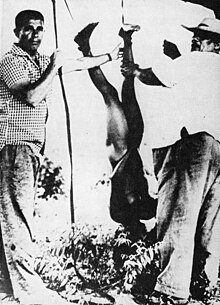
According to Nadia Rubaii, the mass atrocities in Latin America have been less visible internationally for three reasons:
- Victim groups have frequently been attacked for their ideological or political differences, leading the international community to consider such atrocities as domestic political issues.
- Perpetrators who damage ecosystems and means of subsistence argue that they are seeking economic development for common benefit and deny the intention to inflict any harm.
- If there is academic attention to the topic, it is documented in Spanish not in English.
Argentina
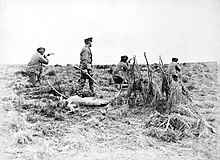
In Argentina, the Conquest of the Desert had been interpreted in war terms, silencing the fact of Indigenous genocide. In the case of the Napalmi massacre, a judge concluded that the massacre took place in a context of genocide. According to Walter Delrio et al. in 2010, "The state still denies the existence of genocide and the existence of crimes against humanity with respect to Indigenous peoples."
Paraguay and Brazil
South African sociologist and genocide scholar Leo Kuper says that genocide has been denied in Paraguay and Brazil on the basis of alleged lack of intent to destroy. For instance, the case of the Ache in Paraguay has been legally determined to be a case of political persecution.
Central America
In Guatemala, debate has occurred over accusations of genocide. The Guatemalan Truth Commission has reported genocide during the 35 year civil war, but some Guatemalan politicians have referred to the conflict as a civil war.
Africa
The Herero genocide is described as the first genocide of the 20th century. In 2012, German politician Uwe Kekeritz said Germany needed to move away from "a culture of denial".

Australia
The Indigenous Australian population experienced the Australian frontier wars, in which there was conflict over territory. Massacres and mass poisonings have also been carried out against Indigenous people.
According to Hannah Baldry, "The Australian Government appears to have long suffered a form of 'denialism' that has consistently deprived the country's Aboriginal population of acknowledgment of the crimes perpetrated against their ancestors." This includes ongoing debates about the interpretation of history, including calling Australia's national myth as an invasion or settlement.
Former Prime Minister John Howard refused to apologize in the Motion of Reconciliation, claiming that the program had no genocidal intent. Former Tasmanian Premier Ray Groom said that "there had been no killing in the island state".

The Australian literary and cultural journal Quadrant has been considered "a key locus of genocide denial". They included common arguments regarding the definitional status of genocide, including the idea "that 'half castes' could not claim Aboriginal status since they were half-European" and that Indigenous people were to blame for their fate due to "their own backwardness"; other articles argued that "frontier massacres were based on misinterpreted statistics and falsehoods".